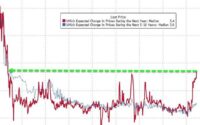President Biden Blames Big Oil Instead of Battling Rising Prices
President Joe Biden says that his top domestic priority is helping Americans weather a surge in prices the likes of which haven’t been seen in four decades—but the president’s actions leave more than a little room to question his commitment.
On Wednesday, for example, Biden fumed about how gas and oil companies are seeing “historically high profit margins” as prices at the pump have climbed to a national average of over $5 per gallon. In a series of letters to CEOs of several major oil producers, Biden threatened to use “all reasonable and appropriate…tools and emergency authorities” to force gas companies to increase refinery capacity and output.
There’s widespread agreement among economists that higher profits are not what’s driving inflation—something even Treasury Secretary Janet Yellen acknowledged last week. Biden blaming “Big Oil” for inflation in gas prices makes as much sense as Sen. Elizabeth Warren (D–Mass.) blaming grocery stores for higher food prices. Or, for that matter, as much sense as Biden blaming oil companies for higher gas prices…in November of last year. This trick has already been tried and it already failed.
Biden can’t flip a magic switch to increase the gasoline supply or otherwise bring down prices at the pump. Expanding the available supply supply of crude oil or the capacity of refineries takes time and money—and those investments are less likely to happen as long as the federal government’s long-term energy policies are aimed at reducing the role of fossil fuels in the economy.
But there is one magic switch that Biden could flip tomorrow to save the average American household about $800 annually: he could repeal the tariffs imposed by former President Donald Trump on steel, aluminum, solar panels, and many other goods imported from China.
Yes, it’s fair to point out that repealing the tariffs won’t solve inflation. It’s likely that only higher interest rates or a debilitating recession will do that. But there’s no doubt that tariffs are contributing to higher prices throughout the economy.
A study released earlier this year by the Peterson Institute of International Economics, a trade-focused think tank, found that a “feasible package” of tariff removals could drop the consumer price index by 1.3 percentage points and translate into $797 in savings for the average household. That study has been cited approvingly by economists like Larry Summers, who served as President Obama’s Treasury Secretary, and Democratic politicians like Colorado Gov. Jared Polis.
How many Americans would like to have an extra $800 to help cover higher prices for the rest of the year? If you’re not raising your hand, I’ll gladly take your share.
Rather than take action, however, the White House is reportedly still mulling just how much of that $800 the average household deserves to see.
“An influential study this year predicted that a move to lift tariffs could save households $797 a year, but administration officials say the actual effect would most likely be far smaller, in part because there is no chance Mr. Biden will roll back all of the federal government’s tariffs and other protectionist trade measures,” The New York Times reported Wednesday.
That’s a rather stunning statement, one that sums up just how out of touch the White House remains, even after months of professing sympathy for Americans being squeezed by higher prices.
Biden is still focused on scapegoating the blame for inflation on oil companies, the Russian war in Ukraine, and other factors. It might be an interesting academic exercise to debate how much of the current inflation was caused by various factors—including the American Rescue Plan, which dumped $1.9 trillion into the economy but somehow always managed to escape Biden’s scrutiny.
But most Americans are probably less interested in that debate than they would be in having an extra $800.
[ad_2]
Source link


